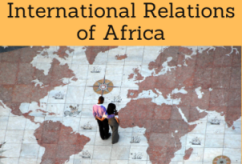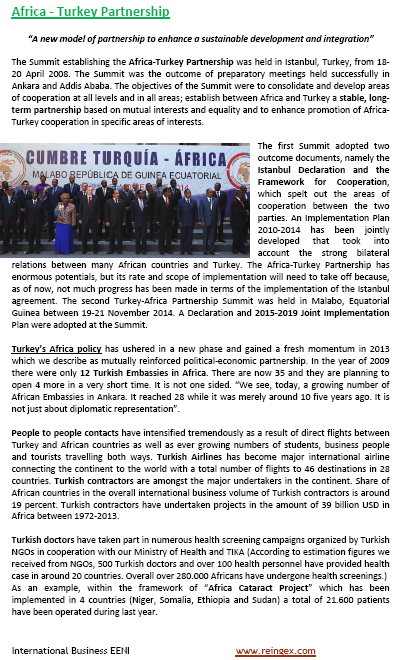
Africa-Turkey Partnership Cooperation
Turkey: strategic partner of Africa. Istanbul Declaration. Foreign Trade
- Introduction to the Africa-Turkey Economic Partnership
- New model of partnership to enhance a sustainable development and integration
- Second Africa-Turkey Summit (Malabo)
- Foreign Trade Africa-Turkey
- Istanbul Declaration on the Turkey-Africa Partnership: Cooperation and Solidarity for a Common Future
- Cooperation Framework for the Turkey-Africa Partnership
The objectives of the subject “Africa-Turkey Economic Partnership” are to:
- Understand the aims of the Turkey-Africa Partnership
- Understand the concept of “Turkey as an Afro-Eurasian country”
- Know the areas of cooperation between Africa and Turkey
- Analyze the foreign trade between the African Countries and Turkey

The Subject “Africa-Turkey Economic Partnership” belongs to the following Online Programs taught by EENI Global Business School:
Courses: Islam & Business, International Relations of Africa.

Master in Business in Africa International Business.
Doctorate in African Business.

EENI Partnerships with Educational Institutions
Languages:  or
or  Partenariat Afrique-Turquie
Partenariat Afrique-Turquie
 África-Turquia
África-Turquia  África-Turquia.
África-Turquia.

Sample - Africa-Turkey Economic Partnership

In 2008 took place the Summit for the creation of the “Africa-Turkey Partnership” like a “new model of long-term partnership to enhance a sustainable development and integration in Africa.”
In this submit was adopted the:
- Istanbul Declaration
- Framework for Cooperation Africa-Turkey
The second summit took place in Malabo (Equatorial Guinea) in 2014, adopting a Joint Implementation Plan.
For the Turkish Government, Africa is a fundamental pillar of his foreign policy.
- Turkey defines himself as an “Afro-Eurasian country”
- In 2005, the Turkish Government declared the “Year of Africa”
- Turkey participates in the African Union as observer status
- In 2005, the African Union declared Turkey “a strategic partner for Africa”
- In 2008, the African Development Bank accepted Turkey as a non-regional member
The objectives of the Africa-Turkey Partnership are:
- To boost the bilateral relations and foreign trade between Turkey and the African Countries
- To support the African Economic Integration and the African Institutions, in particular to the African Union
- To assist in democracy, peace and good governance

Foreign Trade between the African Countries and Turkey:
- Turkey-Africa: 23.4 billion dollars
- Turkey-Sub-Saharan Africa: 7.5 billion dollars
The Africa-Turkey Partnership belongs to
(c) EENI Global Business School (1995-2024)
We do not use cookies
Top of this page



